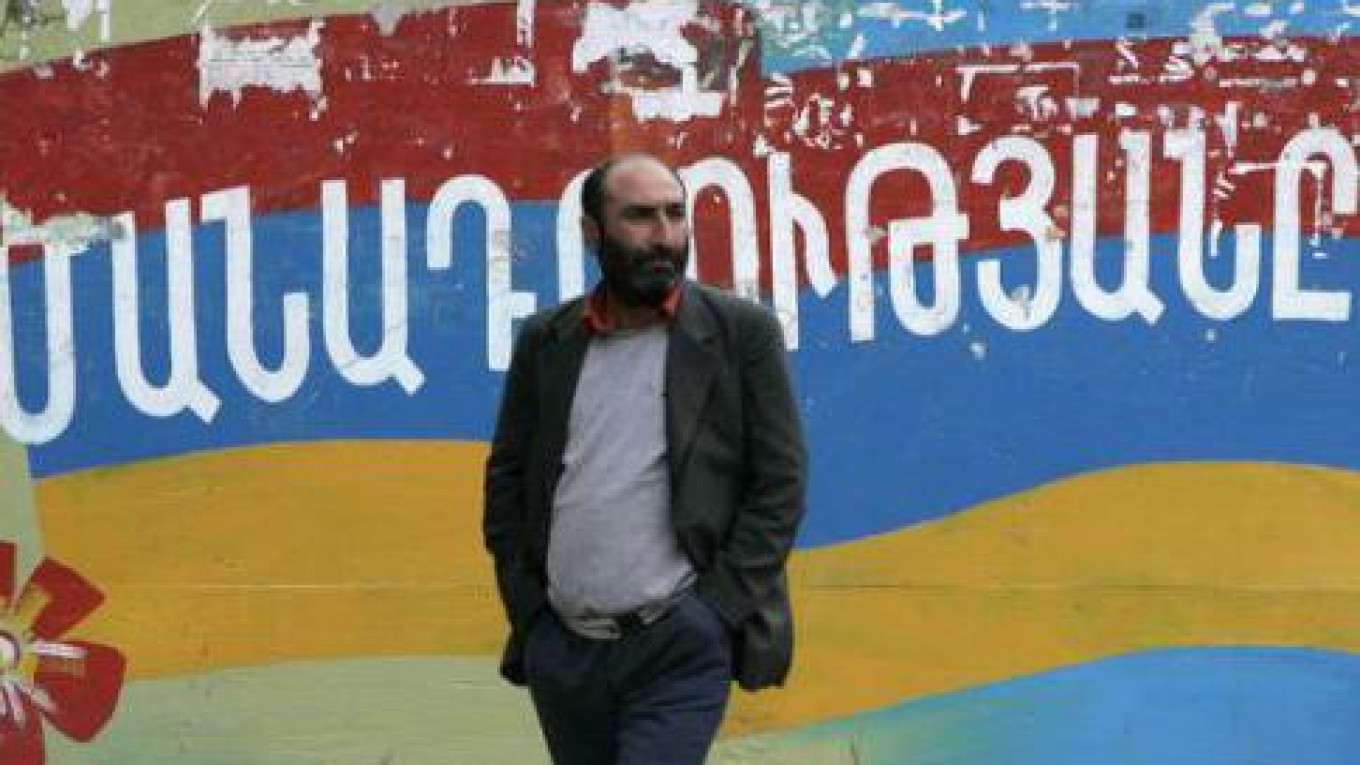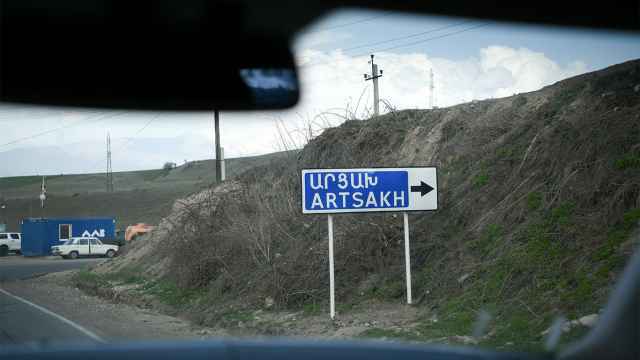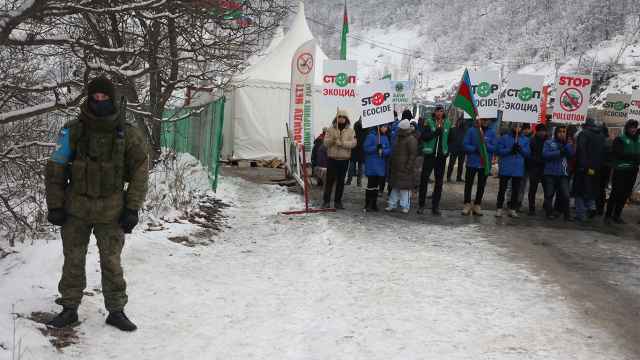For four days in April, the former Soviet Union's oldest frozen conflict erupted. For the first time since a Moscow-brokered 1994 cease-fire, Armenia and Azerbaijan used heavy weapons in the contested region of Nagorno-Karabakh. It ended with Baku taking control of several strategic hills in the region, and left 200 soldiers dead. A full-on war was averted, but the violence was the worst uptick in fighting in 20 years.
The conflict over Nagorno-Karabakh is a throwback to the death-throes of the Soviet Union. In the late 1980s, both Armenia and Azerbaijan spun loose from Moscow's yoke. Amid the chaos of the Soviet collapse, the ethnically Armenian Karabakh region attempted to break from Azerbaijani control. The ensuing war cost 30,000 lives. Russia secured a truce, but failed to secure the peace.
Today, Nagorno-Karabakh exists as a de-facto independent state within Azerbaijan. Both sides have invested considerable domestic political capital in gaining full control over Karabakh. While low-intensity skirmishing has characterized the stand-off for years, the April outbreak was a clear indication that the unresolved tension is boiling over. Eventually, something will have to give.
“The biggest problems are the fundamental disagreements over principles,” says Joshua Kucera, the Caucasus editor at Eurasianet. “For Azerbaijan, that is territorial integrity. For Armenia, it is the self-determination of the local people. This is what they argue about over and over again. Compounding that, both countries have really hardened their stance toward the other after 20 years of conflict.”
Going through the diplomatic motions, the Kremlin stepped in to broker a new round of talks between Armenia and Azerbaijan in June. Mediators from the U.S. and France who — via the Organization for Security Cooperation in Europe (OSCE) — were involved in the original Nagorno-Karabakh cease-fire have complemented Moscow's efforts. But there has been little progress.
Instead, both sides have been digging in. Public opinion in both Azerbaijan and Armenia, stoked by their own governments, has radicalized on the issue of Karabakh. Neither side, it seems, has much room for compromise. Meanwhile, Russia is selling arms to both sides. And just last week, Moscow created a joint military command with Armenia - an indication that things may get much worse.
Arms Race
The diplomatic standstill is nothing new to the Karabakh conflict. And in the absence of asettlement, both sides have been locked in a deepening arms race. According to the Stockholm International Peace Research Institute, oil-rich Azerbaijan has spent some $22.7 billion on military hardware over the past decade. Russia is the main supplier. But it is also buying Israeli kamikaze drones.
Azerbaijan's Defense Ministry in September announced it would begin localized production of the explosive-tipped drones. The unmanned aircraft will be produced in the hundreds, and available for use in the near, but undetermined future, according to a statement on the ministry's website. Across the spectrum of weapons, Azerbaijan has been outspending Armenia's entire state budget.
Moscow, an ally of Armenia in the Collective Security Treaty Organization (CSTO) – a sort of post-Soviet analog to NATO – has been selling weapons to Yerevan at the same time, albeit at a discount price. The idea, Prime Minister Dmitry Medvedev explained in April, is to keep the peace by maintaining parity between the two sides as a form of deterrence. But it is not a convincing one.
“The outlook for the Karabakh conflict remains bleak,” says Richard Giragosian, the head of the Regional Studies Center, an independent think tank in Yerevan. “This Russian policy of balancing both sides with Russian weapons, [and] the absence of any real deterrence means there is nothing and no one preventing Azerbaijan from launching an offensive [as they did in April].”
The fruits of Russia's policy appeared in Yerevan on Sept. 21. During a parade celebrating Armenia's 25th anniversary as an independent state, the Armenian military paraded brand-new, Russian-built Iskander missile systems through the streets. Iskanders are serious hardware, capable of dealing significant damage to Azerbaijani infrastructure as far away as Baku.
“It is no secret that Azerbaijan has regularly purchased state-of-the-art weaponry in the past few years,” Armenian President Serzh Sargsyan told Russia's RIA Novosti news agency on Nov. 17. “We don't have the financial resources that Azerbaijan does, but we are constantly trying to balance the situation by finding an antidote. I think Iskander missiles are the antidote in this case.”
Joint Military Command
In response to Armenia's Iskander messaging, Azerbaijan has been conducting its own military maneuvers designed to intimidate the other side. On Nov. 12, Azerbaijani President Ilham Aliyev praised his armed forces for liberation parts of the “occupied territories” from Armenian control, and promised to liberate Karabakh from the occupiers. More arms purchases are on the way, too.
The posturing of the two presidents coincides closely with a spate of cease-fire violations along the so-called “line of contact” separating Karabakh from the rest of Azerbaijan. At the end of October, Azerbaijan accused Armenia of almost 40 cease-fire violations in a 24-hour period. Accusations of cease-fire violations have not been unheard of following the April skirmish.
With negotiations at their usual impasse, Russia appears to be taking a step forward in ensuring the conflict remains frozen. The status quo, experts say, suits Moscow quite well – it prevents a full-scale war from breaking out, and it prevents other interested powers such as Turkey, Iran or the United States from getting involved in a region Moscow considers to be its backyard.
Last week, President Vladimir Putin ordered his armed forces to finalize plans that have been in the works for years: the creation of a joint military command with Armenia. It is an evolution of their CSTO obligations. Under the agreement, the two will create a unit of Russian and Armenian soldiers. During peacetime, Armenia commands the outfit. But during a war, Moscow takes charge.
“Under this plan, Russian control over Armenian borders would potentially expand from its current supervision of the borders with Turkey and Iran, and include Georgian and Azerbaijan,” Giragosian says. This could, in effect, deter Azerbaijan from any attempts to wrestle control over Karabakh from the Armenians. But it also threatens Armenian sovereignty.
“It could also be an attempt by Moscow to use this new 'joint' structure to intervene in Armenian defense posture and military reforms, [and] to also utilize the unit as a vehicle for the later deployment of peacekeepers in the Nagorno-Karabakh region,” Giragosian says. All of this would cement Moscow's role as the key power broker in the region.
For the moment, there are no good options for lasting peace, and observers are extremely pessimistic. There is, however, some hope. Beneath the hatred and disagreement, both sides continue to express an interest in dialogue. The question remains: how much room do they have to maneuver?
“There is really no public support for compromise,” says Kucera, “any compromise is going to be seen as selling out. So, that is a huge obstacle.”
A Message from The Moscow Times:
Dear readers,
We are facing unprecedented challenges. Russia's Prosecutor General's Office has designated The Moscow Times as an "undesirable" organization, criminalizing our work and putting our staff at risk of prosecution. This follows our earlier unjust labeling as a "foreign agent."
These actions are direct attempts to silence independent journalism in Russia. The authorities claim our work "discredits the decisions of the Russian leadership." We see things differently: we strive to provide accurate, unbiased reporting on Russia.
We, the journalists of The Moscow Times, refuse to be silenced. But to continue our work, we need your help.
Your support, no matter how small, makes a world of difference. If you can, please support us monthly starting from just $2. It's quick to set up, and every contribution makes a significant impact.
By supporting The Moscow Times, you're defending open, independent journalism in the face of repression. Thank you for standing with us.
Remind me later.






